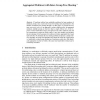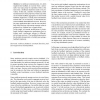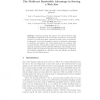NGC
2001
Springer
14 years 1 months ago
2001
Springer
IP multicast suffers from scalability problems for large numbers of multicast groups, since each router keeps forwarding state proportional to the number of multicast tree passing ...
NGC
2001
Springer
14 years 1 months ago
2001
Springer
In multicast communication, it is often required that feedback is received from a potentially very large group of responders while at the same time a feedback implosion needs to be...
NGC
2001
Springer
14 years 1 months ago
2001
Springer
Bi-directional shared tree is an efficient routing scheme for interactive multicast applications with multiple sources. Given the open-group IP multicast service model, it is impor...
NGC
2001
Springer
14 years 1 months ago
2001
Springer
Delivering popular web pages to the clients results in high bandwidth and high load on the web servers. A method to overcome this problem is to send these pages, requested by many ...
NGC
2001
Springer
14 years 1 months ago
2001
Springer
Abstract. Most currently proposed solutions to application-level multicast organize the group members into an application-level mesh over which a DistanceVector routing protocol, o...



